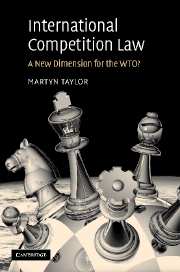Book contents
- Frontmatter
- Contents
- List of tables and figures
- List of abbreviations
- 1 Introduction
- PART I An International Competition Agreement is Desirable
- PART II The WTO Would Provide a Suitable Institutional Vehicle
- PART III The Optimal Form for a WTO Competition Agreement
- 10 What are the optimal objectives and principles for a WTO competition agreement?
- 11 What is the optimal content for a WTO competition agreement?
- 12 What is the optimal structure for a WTO competition agreement?
- 13 Would a WTO competition agreement be politically achievable?
- 14 Conclusion: a plurilateral competition agreement should be incorporated into the WTO
- APPENDIX: Draft negotiating text for a plurilateral WTO competition agreement
- Index
11 - What is the optimal content for a WTO competition agreement?
Published online by Cambridge University Press: 17 July 2009
- Frontmatter
- Contents
- List of tables and figures
- List of abbreviations
- 1 Introduction
- PART I An International Competition Agreement is Desirable
- PART II The WTO Would Provide a Suitable Institutional Vehicle
- PART III The Optimal Form for a WTO Competition Agreement
- 10 What are the optimal objectives and principles for a WTO competition agreement?
- 11 What is the optimal content for a WTO competition agreement?
- 12 What is the optimal structure for a WTO competition agreement?
- 13 Would a WTO competition agreement be politically achievable?
- 14 Conclusion: a plurilateral competition agreement should be incorporated into the WTO
- APPENDIX: Draft negotiating text for a plurilateral WTO competition agreement
- Index
Summary
Following from the analysis in Chapter 10, Chapter 11 now considers the optimal substantive content of a WTO competition agreement.
Chapter 4 of this book analysed similarities between the competition laws of the APEC nations and identified the substantive elements of competition law that could be regulated by a WTO competition agreement. Chapter 4 also identified a number of principles and obligations that could be appropriately incorporated into a WTO competition agreement. However, in order to apply the conclusions from Chapter 4, it is necessary to identify the appropriate level of abstraction, and particular legal character, that should be accorded to such principles and obligations when they are drafted into a WTO competition agreement.
In undertaking this analysis, the following four questions are fundamental:
To what extent should any WTO competition agreement seek to achieve harmonisation of domestic competition laws?
To what extent should any WTO competition agreement seek to prescribe minimum international standards?
To what extent should the provisions of a WTO competition agreement be legally enforceable as binding precepts of international law?
To what extent should any WTO competition agreement seek to modify existing WTO rules and jurisprudence?
Chapter 11 considers each of these four questions in turn below. These four issues are fundamental to the negotiation of a WTO competition agreement as they determine the level of agreement that will be required between nations on any substantive competition obligations.
- Type
- Chapter
- Information
- International Competition LawA New Dimension for the WTO?, pp. 336 - 369Publisher: Cambridge University PressPrint publication year: 2006



